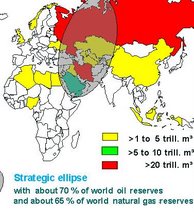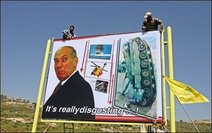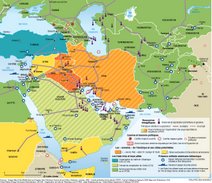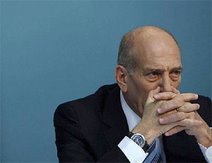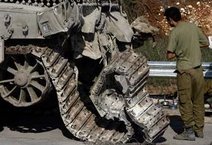 http://www.revisionisthistory.org/talmudtruth.html
http://www.revisionisthistory.org/talmudtruth.html By Richard Sale, author of Clinton’s Secret Wars
In his 1989 book, From Beirut to Jerusalem, Tom Friedman wrote that Israel’s far-right “will never be prepared, for ideological reasons, to allow a Palestinian state in the West Bank or Gaza,” explaining, “They are committed to holding forever the Land of Israel, out of either nationalist or messianic sentiments.”
Friedman has been proved right, but the reluctance of Zionists to share the Land of Israel with the Arabs stretches far back into the origins of the state. Glints of this ruthless intractability could be seen in a recent CBS Sixty Minutes segment about Israeli settlers racing to build new homes in East Jerusalem, an area of the highest historical and religious value to the Muslims there. It is my view that such an action amounts to “aggression by settlement” and will destroy any chances of any agreement in this tragic, ancient quarrel.
As I have said here before, Theodor Herzl, the founder of Zionism, envisioned the Jewish settlement of Palestine as giving rise to “a wondrous breed of Jews...the Maccabees will rise again,” and he talked of the “displacement and transfer” of Palestine’s Arab population, albeit “with full financial compensation,” according to Israeli historian Benny Morris. “We must expropriate gently,” Herzl said. “Both the process of expropriation and removal of the poor (Arabs) must be done discreetly and circumspectly.”
When the British issued the Balfour Declaration in 1917 its real purpose was not to give the Jews a homeland, but to bolster British ability to fight the Germans. In 1917, British forces were bogged down in a stalemate and the British leadership was fearful of the Russians making a separate peace. Also, many Jews in America favored the Central Powers. To curb this and in an effort to draw America into the war, the declaration promised Palestine as “a national home for the Jewish people.”
It is an amazing document. Britain was offering to give away land to which it had no claim, nor did it consult with the thousands of Arabs who had lived in it for 700 years. Eight years after the declaration, Dr. Chaim Weizmann, a prominent Zionist and a key actor in establishing the declaration warned, “Palestine is not Rhodesia, and 600,000 Arabs who live there have exactly the same right to their homes as we have to our national home.”
After pogroms in Russia in 1901, a large influx of Jews into Palestine began and by 1919, tensions between Arabs and the new arrivals were increasing, especially since the Zionists had plans for large scale immigration and settlement. According to Morris, Maj. Gen. Sir Arthur Money of the Occupied Enemy Territory Administration in April 1919 wrote to Lord George Curzon, the British Foreign Secretary, “The Palestinians in fact desire Palestine for themselves, and have no intention of allowing their country to be thrown open to hordes of Jews from Eastern and Central Europe.” To implement the Balfour Declaration “would involve Britain in the use of force in opposition to the will of the majority of the population.”
Another who saw the issue with dazzling clarity was future Israeli President David Ben-Gurion. When it came to Arab versus Jewish aspirations, he said, “...Not everybody sees that there is no solution to this question. No solution! There is a gulf and nothing can bridge it....We as a nation want this country to be ours; the Arabs as a country, want the country to be theirs.”
A Ben-Gurion aide said that should the Jews “...allow a partner into our state – all content and meaning will be lost to the enterprise.”
The Jews intensified their building of settlements and in 1928 violence between Arabs and Jews erupted in a quarrel over construction at the Temple Mount.
Throughout the years until World War II, Jewish purchases of Palestinian land took place, the sales coming from Arab absentee landlords who lived in Turkey or Lebanon and who cared little that Jews were buying it as long as they were paid a good price. But when the Jews bought the land, they evicted the Arab tenants who had lived on it for centuries, Morris says. He adds that the betrayal by absentee Arabs of the Palestinians devastated the Palestinian national movement, and more and more Arabs saw the Jewish immigration as a springboard for Jewish expansion in Palestine.
In any case, Morris claims that by 1936, as some ugly tensions continued to build, Ben-Gurion clearly saw their cause. In May, he said, “The Arab fear of our power is intensifying. (It’s) exactly the opposite of what we see. It doesn’t matter whether or not their view is correct. They see immigration on a giant scale...they see the Jews fortifying themselves economically...They see the best lands passing into our hands...They are fighting dispossession...The fear is not of losing land, but of losing the homeland of the Arab people which others want to turn into the homeland of the Jewish people.”
Ben-Gurion was also candid enough to acknowledge that in the Arab-Israeli political struggle “...we are the aggressors and they defend themselves.”
By 1936 Morris said that no mainstream Jewish leader thought coexistence with Palestinians to be possible and that the Jewish solution lay with a clear physical separation of the two peoples, achievable only by transfer and expulsion of the Arabs. In fact, the Jewish leadership saw transfer as “a highly moral solution,” in the words of one. Leaders felt that the Arab had no ancestral or religious tie to his land and that Jordan or Egypt or Syria would be the same for them as Palestine. Transfer would be best done “voluntarily,” but, if necessary, force would be used. As one Zionist politician Zingwell had said in 1905, “We must be prepared to
drive out by the sword in possession as our forefathers did,” and added that there was “no particular reason for the Arabs to cling to these few kilometers,” as if the Jews’ passionate attachment to the land was unique and peculiar to them.
(This, of course, echoes the earlier British plan to put all their Jews in Uganda or Abraham Lincoln’s scheme to settle former American slaves in Liberia.)
Today, Israel’s hardline far-right is back in power and the persuasiveness of Israel’s Social Democrats is a thing of the past. Headed by Israeli Premier Benjamin Netanyahu, occupying the post for a second time, serious disagreements between the Israeli leader and President Barack Obama over the peace process were quick to emerge and remain in full force. Netanyahu, as usual, stubbornly resists the two-state solution, involving the creation of a viable Palestinian state, which is favored by Obama and his team.
It was clear from the first that the real contest of wills would prove to be the question of Israel’s soaring construction of Israeli settlements on the disputed land of the West Bank. Soon after reaching power, Secretary of State Hillary Clinton unequivocally called for a halt in the construction of all such settlements. When Israeli President Shimon Peres met with President Obama, he talked of trying to get a waiver from the U.S. regarding “construction to accommodate natural growth in the settlements.” Peres added that the children of such settlements “are not going to live on roofs,” ignoring the fact that settlements continue to advertise for home purchasers, evidence of ample capacity.
Secretary Clinton went further by demanding a freeze on “natural growth,” adding, “We want to see a stop to settlement construction – additions, natural growth, any kind of settlement activity – that is what the president called for.”
The reply of the Netanyahu government then became obstinate, a condition, says Schopenhauer, in which the assertive will crowds out the judgment. On the eve of President Barack Obama’s speech at Cairo, Israeli Interior Minister Eli Yishai met with leaders of Israeli settler organizations to announce that all the resources of his office including the ministry’s “impact on local authorities” would be used for “the good of expanding settlements.”
When Israeli officials said that West Bank settlement blocs like Gush Etzion, Alfei Menashe, Ariel, Ma’al and others would remain in Israel under a final status agreement so that there would be no point in preventing construction, Obama officials said they just might initiate immediate final talks on the border between Israel and the future Palestinian state, according to Israel’s Haaretz newspaper.
When Netanyahu officials said that the Obama proposals violated unwritten or verbal agreements about settlements reached with the George W. Bush administration, Secretary Clinton replied that there was “no memorialization (sic) of any informal or oral agreements” and in any case, “...they did not become part of the official position of the United States government.”
Obama had already drawn the stark line during his speech in Cairo when he said, “We do not accept legitimacy of Israeli settlements,” the first time a U.S. president has discussed the legality of the settlements in terms of international law since President Jimmy Carter. Veteran Mideast former U.S. diplomat David Mack told me that the question of legality of the settlements was important because “Israel takes great pride in being a society of laws,” adding that the Israeli Supreme Court had ruled in 2005 that settlements were illegal “under the Geneva Convention.”
When Obama officials recently went further and said that the status of Jerusalem would be determined by peace negotiations, Netanyahu said defiantly, “United Jerusalem is Israel’s capital. Jerusalem was always ours and will always be ours.”
All of which sounds so dreadfully familiar. Israeli historian Benny Morris once wrote, “All Arabs were seen by the Zionists as essentially untrustworthy, not to say treacherous,” and in 1946, Ignatius Mubarak, a noted Zionist, made clear this view when he testified before the Anglo-American Committee, and, a year later, before the UN Special Committee in favor of Zionism. “If you oppose Zionism in Palestine, it means returning the people to the domination of savagery and the country to the state of anarchy and bribery in which it existed under the Ottoman Sultans...here is a struggle between civilization and regression, and the Jews represent civilization,” he said.
So it would appear Israel and the Netanyahu government are faced with the predicament of deciding what kind of society Israel should become – expansive and pluralistic or narrow and exclusive. In a recent article for Haaretz entitled, “Israel is controlled by religious fanaticism,” by Shulamit Aloni, Aloni quoted a 1902 letter sent by Lord Rothschild to Herzl in which Rothschild explained why he could not support the establishment of a Jewish state in the Land of Israel, saying that he would “view with horror the establishment of a Jewish colony pure and simple; such a colony would be imperium imperio. It would be a Ghetto with the prejudice of the Ghetto; it would be a small, petty Jewish state, orthodox and liberal, excluding the Gentile and the Christian.”
What Rothschild wanted was an Israel that would “ensure complete equality and political rights to all its inhabitants regardless of religion, race or sex,” and “guarantee freedom of religion, conscience, language and culture” as stated in the Declaration of the Establishment of the State.
But the present spectacle of deadlock and the unbridled race by Israelis to illegally build homes on territory whose ownership is still in dispute makes one heavy of heart....but their primary aim is to steal more land at all cost....and kick the natives out from Israel proper and from the West Bank.....
 Turkish President, Abdullah Gul, alleged 'agent of the CIA'.
Turkish President, Abdullah Gul, alleged 'agent of the CIA'. David Cameron and Abdullah Gul, November 2010.
David Cameron and Abdullah Gul, November 2010.
 Fethullah Gulen is the founder of the Fethullah or Gulen movement, which most suspect is linked to the CIA.
Fethullah Gulen is the founder of the Fethullah or Gulen movement, which most suspect is linked to the CIA. Former CIA operative Graham Fuller reportedly helped Fethullah Gulen obtain permanent residency status in the USA. (Has the Universal Caliphate Emerged from Pennsylvania? Is the CIA ...)
Former CIA operative Graham Fuller reportedly helped Fethullah Gulen obtain permanent residency status in the USA. (Has the Universal Caliphate Emerged from Pennsylvania? Is the CIA ...)























